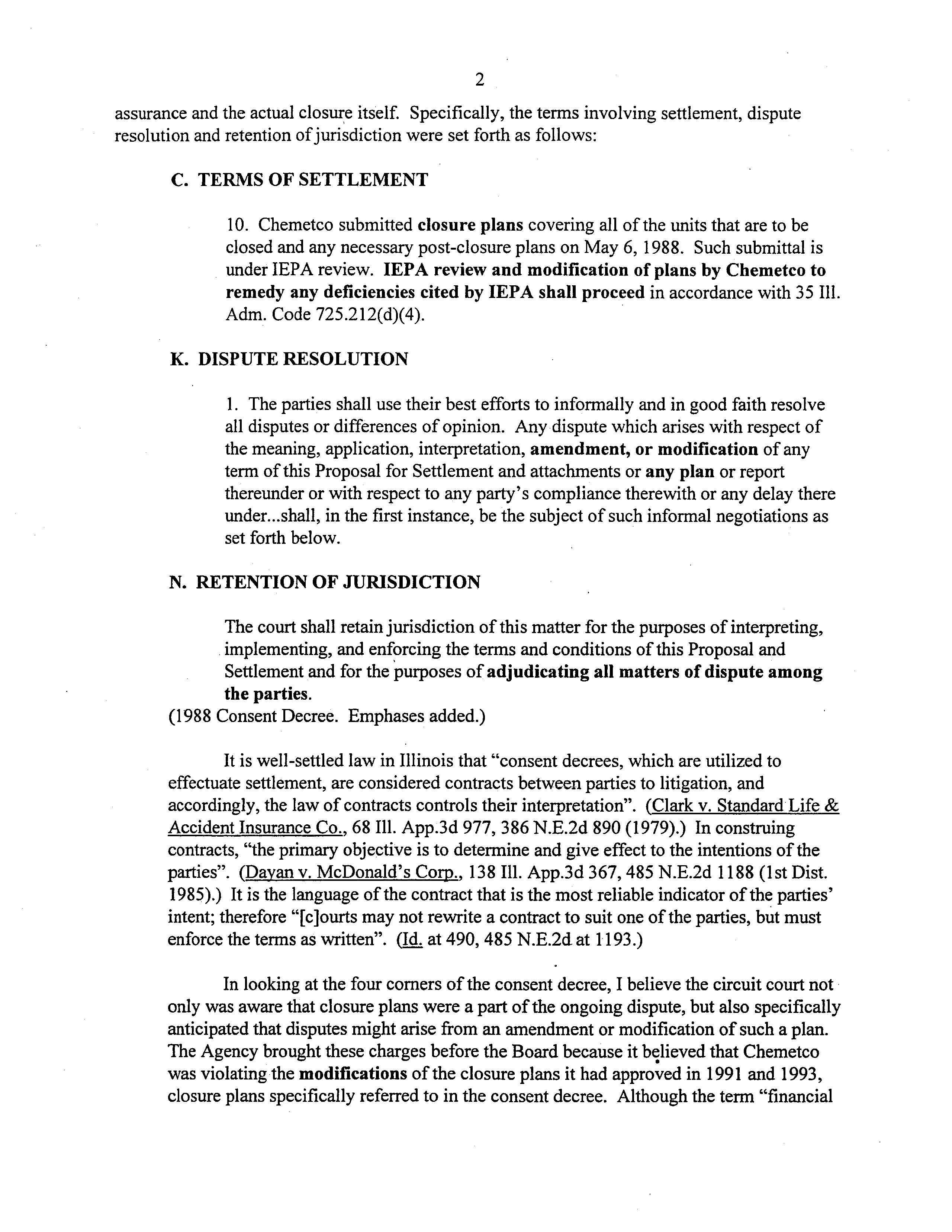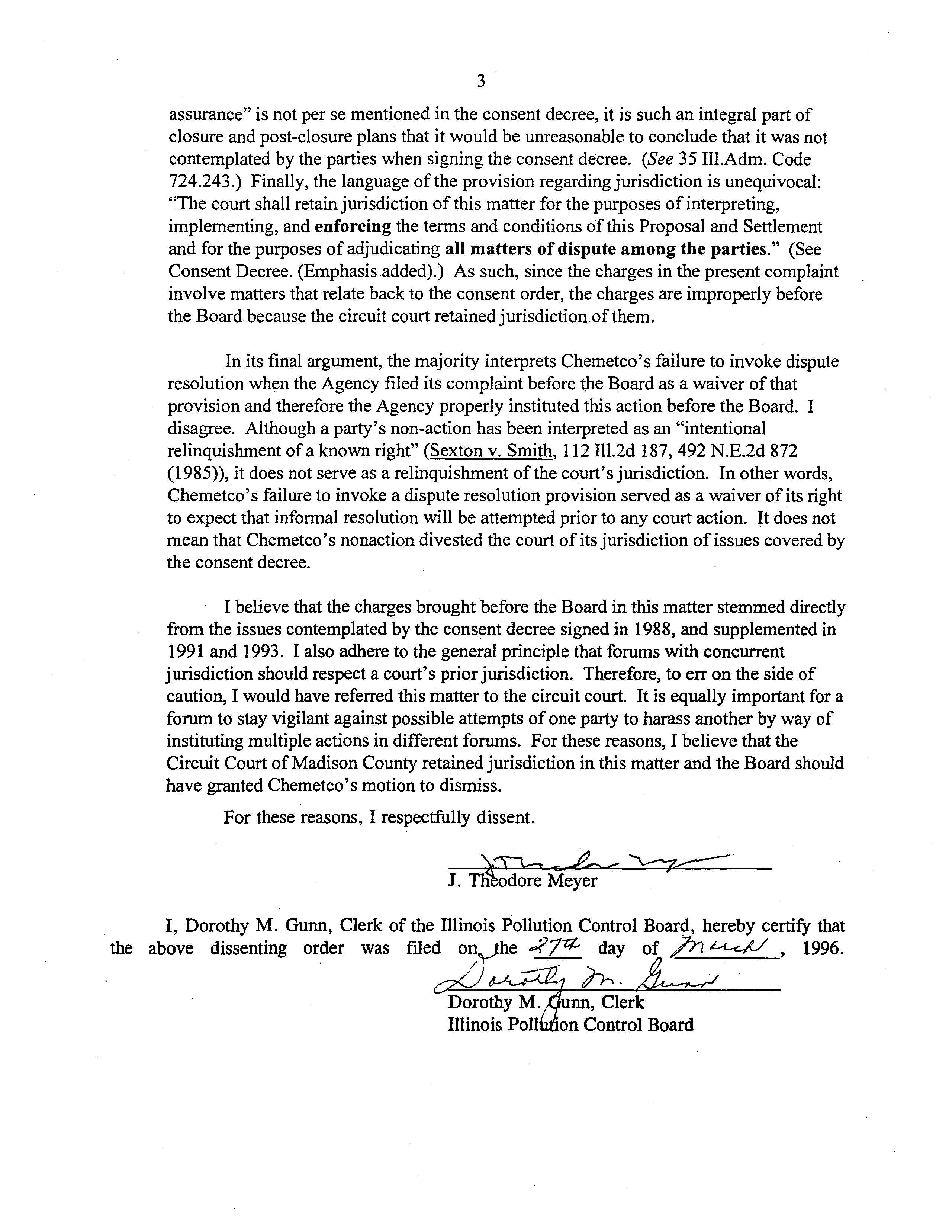ILLINOIS POLLUTION
CONTROL BOARD
March21,
1996
PEOPLE OF THE STATE OF ILLINOIS,
)
)
Complainant,
)
)
PCB 96-76
v.
)
(Enforcement
-
RCRA)
)
CHEMETCO INC.,
)
)
Respondent.
)
DISSENTING OPINION (by J. Theodore Meyer):
In
1988
the
parties
in
this
case
signed
a
consent
decree
as
a
resolution
to
charges
brought
before the
Circuit
Court
of Madison
County
in
1982
which
included
the
following:
noncompliance
with
daily
maximum
effluent
concentrations;
exceedence
of
daily
effluent
standards
and
water
quality
standards;
open dumping;
storage of hazardous wastes;
failure
to
use protective cover and manage
slag; and
failure to prepare
closure and post-closure plans.
(See
1988
complaint,
counts
I-XII
(Emphasis added.)
The
action
before the
Board
involves
violations for failure
to properly
implement the
closure and
post-closure
plans.
The
majority
believes
that
these violations
are distinct
from
those
contemplated
in
the
consent decree
and
therefore accepts jurisdiction in this matter.
I disagree for the following reasons.
The majority’s first argument is that
the present allegations contained in the complaint
before the Board do not relate backto the original
1988 controversy.
As proofthe majority
points to the 1988 complaint “covenant not to sue” to claim that it only pertains to a time period
from May 1982 to June 1988, while the complaint before the Board involves a time period from
April
1991
to May 1992.
I disagree.
Covenant-not-to-sue provisions
in consent decrees are applied prospectively,
not for a
certain time period, especially if the consent decree
directs parties to complete certain
actions
in the future.
(Comet
Casualty Co.
v.
Schneider, 98
Ill. App.3d 786,
424 N.E.2d 911,
914-915
(1st Dist.
1981).)
If charges are brought
in
1982
and
six years
later the parties sign a
consent decree,
the parties are agreeing not
to
sue under the same charges not only
during that
time period, but also
in the future.
If a dispute regarding matters
covered by the consent decree
occurs
in
May
1992,
the
consent
decree’s covenant-not-to-sue
still
applies
and
the parties
are
bound by it.
The majority’s second argument states that the consent order did not include a specific
closure agreement between the parties and did not mention financial assurance at all; therefore,
the complaint before the Board is
a separate enforcement action.
However, I believe several
terms in the consent order do include the concept ofclosure plans,
post-closure plans, financial
2
assurance and the actual closure itself.
Specifically, the terms involving settlement, dispute
resolution and
retention ofjurisdiction were set forth as follows:
C.
TERMS
OF SETTLEMENT
10.
Chemetco submitted closure plans covering all ofthe units that are to be
closed and any necessary post-closure plans on May 6,
1988.
Such submittal is
under IEPA review.
IEPA review and modification of plans by Chemetco to
remedy any deficiencies cited
by IEPA shall proceed in accordance with 35
Ill.
Adm. Code 725.212(d)(4).
K.
DISPUTE RESOLUTION
1.
The parties shall use their best efforts to informally and in good
faith resolve
all disputes or differences of opinion.
Any dispute which arises
with respect of
the meaning, application, interpretation, amendment, or modification ofany
term ofthis Proposal for Settlement and attachments or any plan orreport
thereunder or with respect to any party’s compliance therewith or any delay there
under...shall, in the first instance, be the subject ofsuch informal negotiations as
set forth
below.
N.
RETENTION
OF JURISDICTION
The court shall retain jurisdiction ofthis matter forthe purposes of interpreting,
implementing, and enforcing the terms and conditions ofthis Proposal and
Settlement and for the purposes ofadjudicating
all matters of dispute among
the parties.
(1988 Consent Decree.
Emphases added.)
It is well-settled law in Illinois that “consent decrees, which are utilized to
effectuate settlement, are considered contracts between parties to litigation, and
accordingly, the law ofcontracts controls their interpretation”.
(Clark v.
Standard Life &
Accident Insurance Co., 68 Ill. App.3d 977,
386 N.E.2d 890 (1979).)
In construing
contracts,
“the primary objective is to determine and give effect to the intentions ofthe
parties”.
(Dayan v.
McDonald’s Corp.,
138 Ill. App.3d 367, 485 N.E.2d 1188
(1st Dist.
1985).)
It is the language ofthe contract that
is the most reliable indicator ofthe parties’
intent; therefore “~courts
may not rewrite a contract to
suit one ofthe parties, but must
enforce the terms as written”.
(Id. at 490, 485 N.E.2d. at 1193.)
In looking at the four corners ofthe consent decree, I believe the circuit court not
only
was aware that closure plans were a part ofthe ongoing dispute, but also
specifically
anticipated that disputes might arise from an amendment or modification ofsuch a plan.
The Agency brought these charges before the Board because itbelieved that Chemetco
was violating the modifications ofthe closure plans it had approved in 1991
and 1993,
closure plans specifically referred to in the consent decree.
Although the term “financial
3
assurance” is not per se mentioned in the consent decree,
it is such an integral part of
closure and post-closure plans that it would be unreasonable to conclude that it was not
contemplated by the parties when signing the consent decree.
(See 35
Ill.Adm. Code
724.243.)
Finally, the language of the provision regarding jurisdiction is unequivocal:
“The court shall retain jurisdiction ofthis matter for the purposes ofinterpreting,
implementing, and enforcing the terms and conditions ofthis Proposal and
Settlement
and for the purposes ofadjudicating
all
matters ofdispute among the parties.”
(See
Consent Decree. (Emphasis added).)
As such, since the charges in the present complaint
involve matters that relate back to the consent order, the charges are improperly before
the Board because the circuit court retained jurisdiction~of
them.
In its final argument, the majority interprets Chemetco’ s failure to invoke dispute
resolution when the Agency
filed its complaint before the Board as a waiver ofthat
provision and therefore the Agency properly instituted this action before the Board.
I
disagree.
Although a party’s non-action has been interpreted as an “intentional
relinquishment ofa known right” (Sexton v. Smith,
112 Ill.2d
187, 492 N.E.2d 872
(1985)),
it does not serve as a relinquishment ofthe court’sjurisdiction.
In otherwords,
Chemetco’s failure to invoke a dispute resolution provision served as a waiver of its right
to expect that informal resolution will be attempted prior to any court action.
It does not
mean that Chemetco’s
nonaction divested the court of its jurisdiction of issues covered by
the consent decree.
I believe that the charges brought before the Board in this matter stemmed directly
from the issues contemplated by the consent decree signed in
1988, and supplemented in
1991
and
1993.
I also adhere to the general principle that forums with concurrent
jurisdiction should respect a court’s prior jurisdiction.
Therefore, to err on the side of
caution, I would have referred this matter to the circuit court.
It is equally important for a
forum to stay vigilant against possible attempts ofone party to harass another by way of
instituting multiple actions in different forums.
For these reasons, I believe that the
Circuit Court ofMadison County retainedjurisdiction in this matter and the Board should
have granted Chemetco’s motion to dismiss.
For these reasons,
I respectfully dissent.
J.
Theodore Meyer
I,
Dorothy M.
Gunn,
Clerk of the Illinois
Pollution Control Board, hereby
certify
that
the
above
dissenting
order
was
filed
on~Jhe
‘~‘7~
day
of
,Zi
‘-~--~/~-“
,
1996.
~
~.
4~
Dorothy
M.4inn,
Clerk
Illinois
Po1Iu~on Control Board



